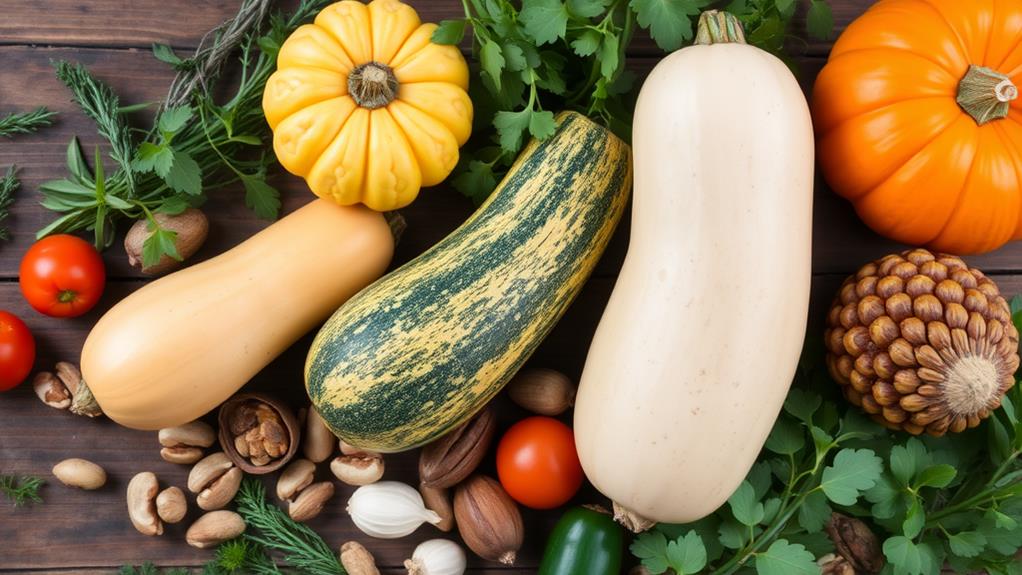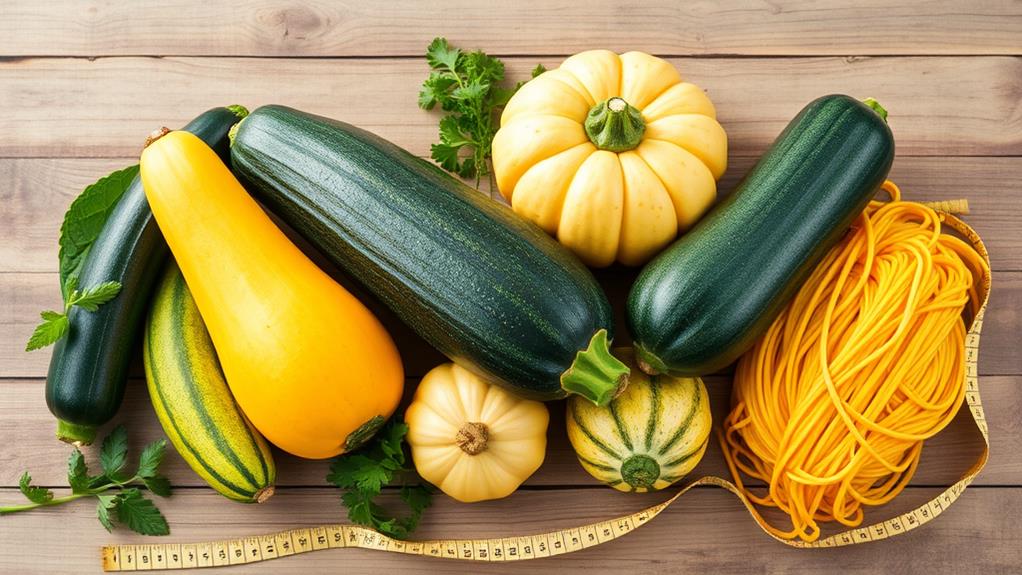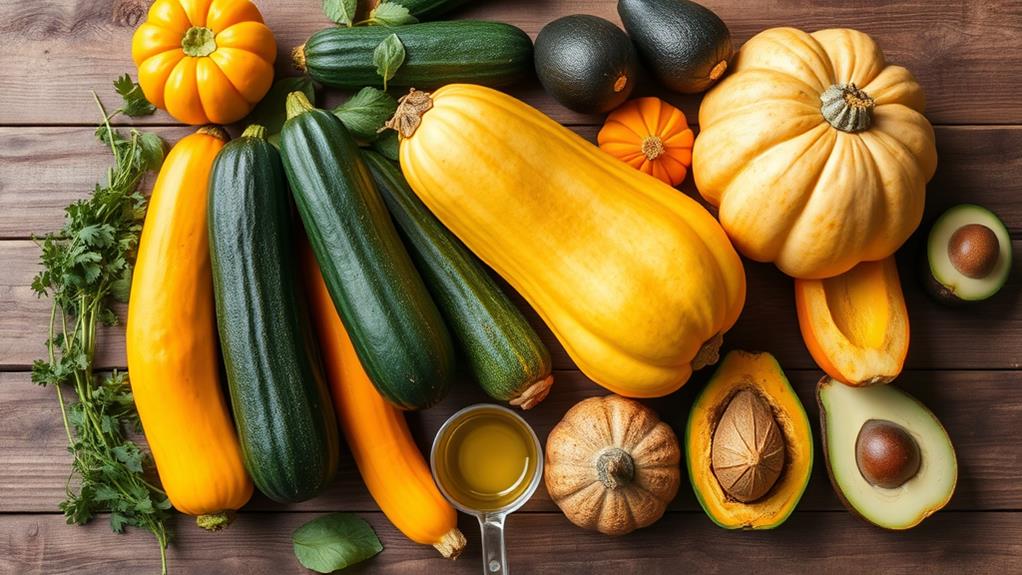Squash is keto-friendly because it's low in net carbs and packed with nutrients. Varieties like yellow squash and zucchini offer about 3 grams of net carbs per 100 grams, making them ideal for your low-carb meals. They're also rich in vitamins A and C, which support your immune health. Portion control is key with types like butternut squashes that can contain around 15 grams of net carbs per cup. Cooking methods like roasting and spiralizing enhance flavors while keeping carbs low. There's much more to discover about integrating squash into your keto lifestyle!
Types of Keto-Friendly Squash
When it comes to incorporating squash into your keto diet, you'll find several options that keep your carb count low. Among the types of squash, yellow squash stands out as a top choice, containing only about 3g of net carbs per 100g serving. This makes it a fantastic keto-friendly vegetable that you can enjoy without guilt.
Additionally, summer squash varieties have a low glycemic index, which makes them suitable for maintaining stable blood sugar levels lower GI values. Spaghetti squash is another great option, offering around 7g of net carbs per 100g serving. It serves as a popular low-carb alternative to traditional pasta, making it a favorite in many keto recipes.
However, be cautious with butternut squash, which packs about 15-16g of net carbs per cup. While it's nutritious, you'll need to practice portion control if you want to include it in your low-carb diet.
It's worth noting that winter squash varieties, like acorn squash, aren't as keto-friendly, coming in at approximately 20g of net carbs per cup. Instead, focus on summer squash varieties, like zucchini and yellow squash, for a more compatible addition to your keto meal plan.
These choices will help you maintain your carb limits while enjoying delicious meals.
Nutritional Benefits of Squash
While you may think of squash primarily as a low-carb option for your keto diet, its nutritional benefits extend far beyond just carb counts. Varieties like yellow and spaghetti squash are particularly appealing, containing only about 3g of net carbs per 100g serving.
Even butternut squash, with approximately 15-16g of net carbs per cup, can fit into your meal plan in moderation. Additionally, squash can be a delightful alternative to other keto-friendly vegetables, such as avocado – a nutrient-rich superfood that also supports weight loss efforts.
Beyond its carb content, squash boasts an impressive nutritional profile. It's rich in vitamins A and C, essential nutrients that boost your immune function and overall health.
The high dietary fiber content helps promote digestive health and can lower net carb counts, making it easier for you to maintain ketosis.
Moreover, the antioxidants found in squash, such as beta-carotene and vitamin C, play a significant role in reducing inflammation and oxidative stress.
These health benefits not only support your keto diet but also contribute to your long-term well-being. Incorporating squash into your meals means you're not just enjoying a tasty ingredient; you're also fueling your body with crucial nutrients that support a healthy lifestyle.
Cooking Squash for Keto Diet

Cooking squash for your keto diet offers a delicious way to enjoy this versatile vegetable while reaping its nutritional benefits. Whether you're using butternut squash, spaghetti squash, or yellow squash, there are various cooking methods that can enhance flavor and maintain its low net carbs.
For instance, you can incorporate squash into low-carb breakfast ideas like a savory omelette or a flavorful side dish. Here are some great options for incorporating squash into your meals:
- Roasting: Caramelizes the natural sugars, making it sweeter and more flavorful.
- Steaming: Preserves nutrients while keeping the texture tender.
- Grilling: Adds a smoky flavor, perfect for summer dishes.
- Mashed: Butternut squash can be mashed for a creamy side dish, just remember portion control due to its higher net carbs.
Spaghetti squash serves as a fantastic low-carb pasta alternative, with approximately 7g of carbs per 100g serving.
Meanwhile, yellow squash has a low net carb count, making it an excellent addition to your keto recipes. Pair squash with high-fat ingredients like olive oil or cheese to balance your macronutrient profile and meet your dietary needs effectively.
Enjoy experimenting with these cooking techniques to create satisfying, keto-friendly meals!
Portion Control With Squash
When you're incorporating squash into your keto meals, carb counts really matter.
The benefits of a keto diet for blood sugar control emphasize the importance of maintaining stable glucose levels, which can be compromised with excessive carbohydrate intake.
Stick to serving size guidelines, especially with higher-carb options like butternut squash, and balance them with healthy fats.
This way, you can enjoy squash without risking your ketosis.
Carb Counts Matter
Understanding carb counts is vital for maintaining a keto-friendly diet, especially when it comes to squash. While many varieties can fit into your low-carb lifestyle, not all squash is created equal.
For instance, yellow squash is considered one of the best options, containing only about 3g of carbs per 100g serving. In contrast, butternut squash has a notably higher carb content, with around 15-22 grams per cup, making it essential to monitor your serving size.
Here are some key points to remember:
- Yellow squash has approximately 3.3 grams of net carbs per cup.
- Spaghetti squash offers about 7g of carbs per 100g serving, providing a pasta-like texture.
- High-carb varieties like butternut and acorn squash require portion control to avoid exceeding your daily carb intake.
- Consistent tracking of carb counts helps maintain ketosis effectively.
Serving Size Guidelines
Portion control is essential for keeping your keto-friendly diet on track, especially with squash. When you're planning your meals, it's important to stick to recommended serving sizes to stay within your daily net carb limits.
For yellow squash, aim for about one cup raw, which offers around 3.3 grams of net carbs. This makes it easy to fit into your keto diet without overdoing it.
When it comes to butternut squash, limit your serving to half a cup cooked, providing approximately 7.5 grams of net carbs. Spaghetti squash is a great option, too, as you can enjoy up to one cup, which contains only about 6 grams of net carbs.
However, be cautious with winter squash varieties, like acorn squash, which can pack up to 20 net carbs per cup. Monitoring these servings is important, as even low carbohydrate squash can quickly add up and affect ketosis if you indulge too much.
Consistent tracking of your serving sizes guarantees you stay aligned with your daily net carb goals while enjoying the delicious variety that squash is a type of.
Balancing With Fats
Incorporating squash into your keto diet requires a thoughtful approach to balance its carb content with healthy fats. With butternut squash containing about 15-16 grams of net carbs per cup, it's important to practice portion control to stay within your daily carb limits.
However, you can enjoy squash by pairing it with high-fat ingredients that enhance flavor while supporting ketosis.
Consider these tips for balancing your meals:
- Use olive oil when roasting squash to add healthy fats and improve satiety.
- Experiment with cheeses like parmesan or cream to create rich, satisfying dishes.
- Opt for yellow squash, which has only about 3 grams of net carbs per 100g, allowing for more generous portions.
- Track your serving sizes closely; for example, keep butternut squash to 100g in recipes to maintain manageable net carbs.
Common Myths About Squash

You might think all squash is too high in carbs for your keto diet, but that's not the case with varieties like yellow and spaghetti squash.
Many underestimate the health benefits of squash, which is packed with essential vitamins and antioxidants promoting overall wellness.
Plus, squash can be incredibly versatile in your recipes, serving as a great pasta substitute or a tasty addition to casseroles.
Carb Misconceptions Explained
Despite popular belief, not all squash varieties are too high in carbs for a keto diet. In fact, options like yellow squash and spaghetti squash are low in net carbs, making them great additions to your meals.
While keto butternut squash has around 15-22 grams of carbohydrates per cup, it's manageable with portion control, especially on a less strict keto plan.
Here are some carb misconceptions about squash:
- Low net carbs: Raw yellow squash contains only about 3.3 grams of net carbs per cup.
- Nutrient-rich: Squash varieties are packed with vitamins and minerals, such as vitamins A and C.
- Low glycemic load: This means they've minimal impact on insulin levels, making them keto-friendly.
- Healthy fats: Pairing squash with healthy fats can enhance flavor and keep you satiated.
Health Benefits Underestimated
The nutritional value of squash is often underestimated, leading many to dismiss its health benefits. In reality, squash is packed with vitamins A and C, which enhance immune function and support eye health.
Varieties like yellow squash and zucchini are particularly high in fiber, aiding digestion and helping you maintain lower net carbs, making them ideal for a keto diet.
A common myth is that all squash is too high in carbs; however, options like spaghetti squash and yellow squash have just 3-7 grams of carbs per 100g serving, proving to be keto-friendly. This low glycemic load means squash has minimal impact on insulin levels, helping you keep stable blood sugar levels within a keto framework.
Additionally, the antioxidants found in squash, such as beta-carotene and vitamin C, help reduce inflammation and oxidative stress, conditions linked to chronic diseases.
Versatility in Recipes
Incorporating squash into your meals opens up a world of culinary possibilities that defy the common myths surrounding this versatile vegetable. Many people mistakenly believe that all squash is too high in carbs for a keto diet, but varieties like yellow summer squash actually contain low grams net carbs. This makes them perfect for keto dieters seeking delicious and satisfying meals.
Here are some creative ways to enjoy squash:
- Use spaghetti squash as a pasta substitute in your favorite dishes.
- Try mashed butternut squash with creamy cheese for a rich, delicious side dish.
- Whip up a Cheesy Yellow Squash Casserole for a fulfilling comfort food option.
- Incorporate yellow squash into sweet recipes like Keto Apple Pie for added moisture and a hint of sweetness.
With its low glycemic load, squash allows for versatility in recipes without causing drastic spikes in blood sugar.
Whether you're looking for savory or sweet options, squash recipes can easily fit into your ketogenic lifestyle, proving that this underrated vegetable deserves a spot on your plate.
Low-Carb Alternatives to Squash
Finding low-carb alternatives to squash can elevate your keto meal prep and keep your dishes exciting.
Spinach, for example, is an excellent addition to your diet, being extremely low in carbs while also rich in vitamins and minerals. If you're looking to maintain a keto lifestyle, zucchini is a fantastic choice, boasting only about 3 grams of net carbs per 100g serving. This makes it an ideal substitute for squash on a keto diet.
You can also consider cauliflower, which has just 2 grams of net carbs per 100g. It's incredibly versatile, easily replacing rice or mashed potatoes.
Eggplant is another great option, offering around 3 grams of net carbs per 100g, perfect for casseroles and hearty dishes. If you want something nutrient-dense, broccoli and Brussels sprouts are excellent low-carb alternatives, with approximately 4 and 6 grams of net carbs per 100g, respectively. They support a balanced keto diet while adding variety to your meals.
Additionally, keto-friendly vegetables can enhance your nutrient intake.
Lastly, if you miss pasta, try shirataki noodles. With a zero-carb count, these noodles allow you to enjoy your favorite pasta dishes without worrying about the amount of carbs.
Health Benefits of Squash

Squash offers a range of health benefits that can complement your keto lifestyle. With varieties like yellow and spaghetti squash being low in carbs—yellow squash contains about 3g of net carbs per 100g serving—you can enjoy delicious meals without compromising your diet.
Here are some key health benefits of squash:
- High in Vitamin A: Butternut squash packs a punch with about 457% of the Recommended Daily Intake (RDI) of vitamin A per serving, essential for eye health.
- Rich in Antioxidants: The antioxidants in squash help combat oxidative stress and inflammation, reducing the risk of chronic diseases.
- Digestive Health: The fiber content in squash, especially butternut squash with 6-7 grams of fiber per cup, promotes digestive health and increases satiety.
- Low in Carbs: Incorporating squash into your meals adds low-carb options rich in essential vitamins and minerals like potassium and magnesium, supporting ideal bodily functions.
Incorporating Squash Into Meals
When planning your meals, consider the versatility of squash as a delicious, low-carb option that fits perfectly into your keto lifestyle. Squash varieties like yellow squash and spaghetti squash are particularly appealing, with yellow squash containing just 3g of net carbs per 100g serving.
You can easily substitute spaghetti squash for pasta in your favorite recipes, cutting down on carbs while enjoying a satisfying texture.
Roasted butternut squash makes for a nutritious side dish. Simply toss it with olive oil and your favorite seasonings before roasting it to perfection.
For a comforting meal, puree butternut squash into a creamy soup, being mindful of portion sizes to keep the net carbs in check.
Don't forget to enhance the flavor of your squash dishes by incorporating high-fat ingredients like cheese or cream. This not only adds richness but also supports your high-fat dietary needs.
By creatively incorporating squash into your meals, you can enjoy its delicious flavors while staying aligned with your keto goals.
Key Takeaways on Squash

Incorporating squash into your keto meals offers numerous benefits worth noting. Different varieties of squash can fit seamlessly into your low-carb lifestyle, allowing you to enjoy delicious dishes while staying within your carbohydrate limit.
Here are some key takeaways:
- Yellow squash and spaghetti squash provide only 3-7 grams of net carbs per 100g serving, making them ideal for keto.
- Butternut squash, with approximately 15-16 grams of net carbs per cup, requires portion control for strict keto adherence.
- Squash is high in fiber and packed with vitamins A and C, which can boost your immune system and promote overall health and wellness.
- With a low glycemic load, squash has minimal impact on insulin levels, making it a smart choice when consumed in moderation.
Embracing these squash varieties can enhance your meals while keeping your total carbs in check.
By prioritizing nutrient-dense foods like squash, you support your health and wellness goals without compromising on taste.
Conclusion
Incorporating squash into your keto diet can be a delightful surprise, blending flavor and health seamlessly. As you explore its nutritional benefits and versatility, you might find yourself wondering how you ever lived without it. Remember, though, moderation is key, and the right preparation can elevate your meals to new heights. So, as you begin this culinary journey, keep your mind open—you just might discover a newfound favorite that keeps your taste buds excited and your diet on track.







